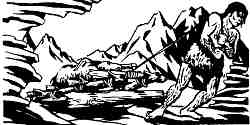 But the time interval between the prehistoric rolling log and the
Egyptian chariot wheel must have been thousands of years. With the
coming of the new method of moving things, various types of problems
put in their appearance. The discs wore badly on the edges so some
ingenious man split a sapling and wrapped the thin, flexible strips
around the rim - this was the first tire. The axle shaft would
wear, so the development of lubricants and bearings started. And when
people began to ride in the carts, the question of comfort arose and
the spring was born. All of these inventions improved the various
pieces of apparatus and great progress started, particularly when
the railroad and automobile came along. But, up to the time of the
bicycle and the pneumatic tire, the Egyptian chariot and the wagon
wheel of today were basically the same.
But the time interval between the prehistoric rolling log and the
Egyptian chariot wheel must have been thousands of years. With the
coming of the new method of moving things, various types of problems
put in their appearance. The discs wore badly on the edges so some
ingenious man split a sapling and wrapped the thin, flexible strips
around the rim - this was the first tire. The axle shaft would
wear, so the development of lubricants and bearings started. And when
people began to ride in the carts, the question of comfort arose and
the spring was born. All of these inventions improved the various
pieces of apparatus and great progress started, particularly when
the railroad and automobile came along. But, up to the time of the
bicycle and the pneumatic tire, the Egyptian chariot and the wagon
wheel of today were basically the same.But the use of rolling vehicles had a powerful influence on civilization - distances were shortened - commerce and communication moved ahead. The people gave up walking and began to ride. Whether it was a Roman cart rolling into Gaul or a prairie schooner crossing our western plains, they both did their share in expanding the frontiers. |








